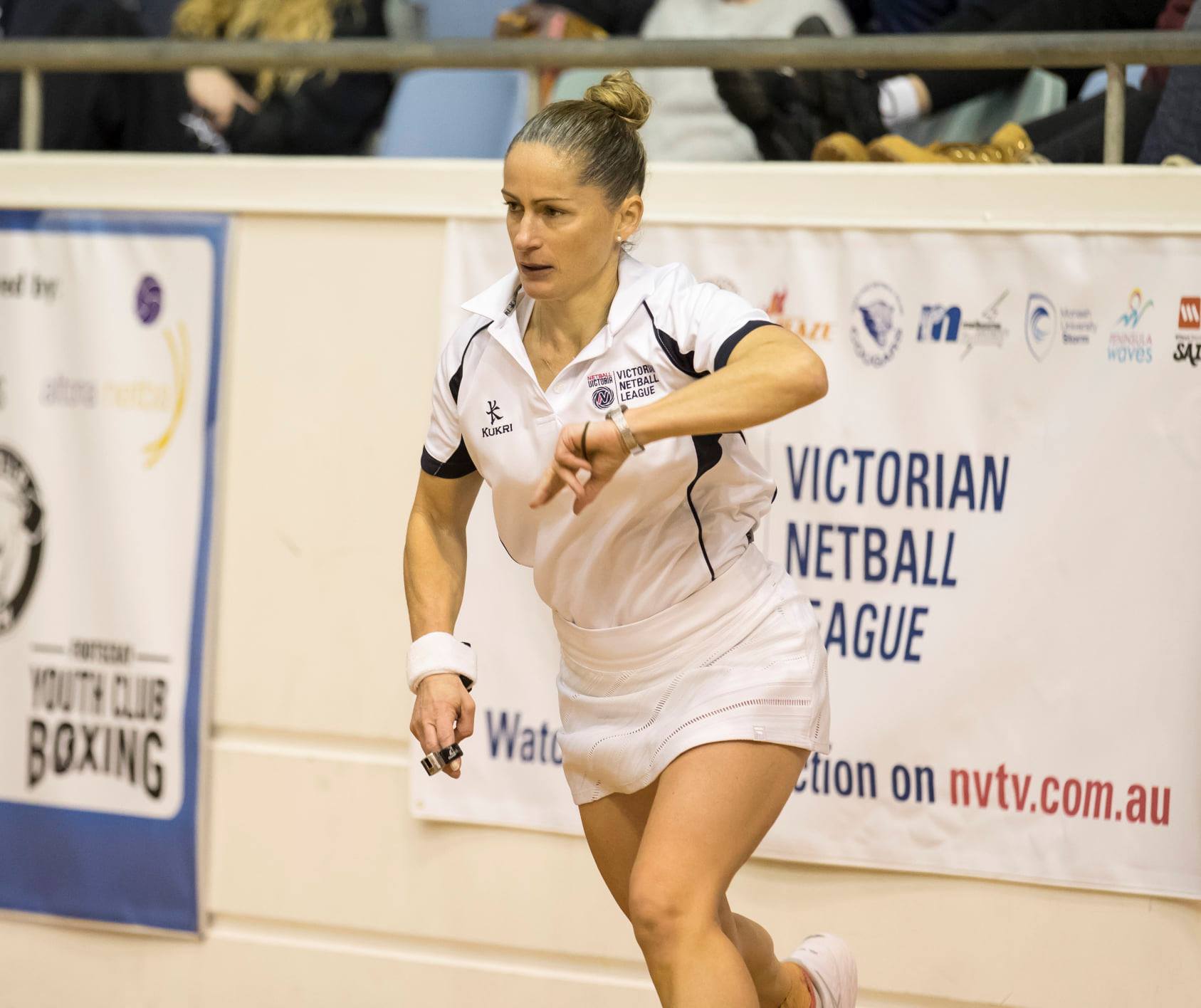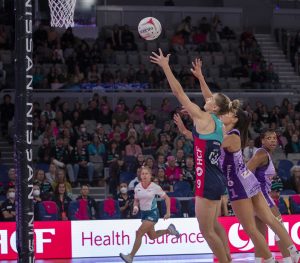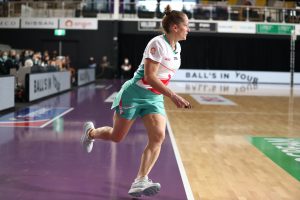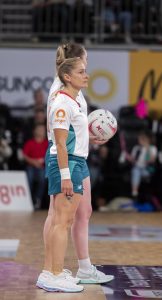
Kate Wright is the embodiment of professionalism and class as an elite Suncorp Super Netball (SSN) Umpire and currently holds the highest level of netball accreditation – the International Umpire Award (IUA). Wright earned her badge through her hyper-consistency and dedication to professional development, having been an elite umpire for 23 years and an international umpire for 21 years, with over 50 national test caps to her name.
You may have seen Kate Wright umpire at the Team Girls Cup or the SSN in rounds three to seven, so far. Beyond the SSN, Wright also officiated the PacificAus Series in Sydney in March this year.
“Team Girls Cup was fantastic. I missed the first week [of SSN] because I was at the PacificAus Series, which was Tonga, Fiji, Samoa, PNG [Papua New Guinea], and Singapore.
“The PacificAus Series was held in Sydney and was the first international tournament I have done in two years because we have not had access to international travel. They play a different style and it’s a different environment [to SSN]; the noise level is just intense. They are all in their national costumers, they are singing and it’s special. There is a lot of passion because they are playing for their country.”
When she returned, Wright had to overcome Covid before stepping out on the court for the SSN competition.
“And then I came back and got Covid, so I was out for the second round. And the third round was a rush- three games in five days.”
Predictions of the top teams this year proved difficult to assert, not only because it is still early days, but also because of the marked difference in this year’s competition.
“The season is still unravelling a bit for me. It is different this year. There are different team structures, different set ups, we’ve lost some of our Internationals, we have gained some others. I think it is still early days.”
The crowd is often described as the eighth player, and this not only affects players, but umpires too, who fine tune their attention to the game with inspiration from the crowd. Having just recently umpired the International PacificAus Series, Wright was reacquainted with the impact of the spectators and gives insight into its dynamic and interactive nature.
“You learn to block out certain elements of the crowd. You can sense when a team is coming back and when there is that increased urgency of their play. You can feel that with the crowd because they get behind them and generate momentum and you need to recognise that and just stay calm and umpire the same that you have been for the whole game.”
“The unsavoury parts that might come with it, you just need to block that out. People are there to support a team and they might see it one way, but it’s not always the way that the umpire sees it and they might not agree, which is fine because that’s my job.”
Wright highlights how reading the play differs when in situations, like in the hub, where there was no crowd.
“It’s weird to go into a game without a crowd, which we had several times early in the hub environments. I think it impacts the players as well. They start to do some funny things, a few more dropped balls, it is almost like their concentration drops too. It’s an amazing feeling when you step out into the pre-match environment, and you can feel the crowd coming in and there’s a buzz in the stadium. It helps you focus.”
“You have to use all of your other senses to see what the girls are doing on the court, because it is so tightly contested and then when there’s no crowd you all of a sudden have this different element of sound that comes into it because you can actually hear them coming together, their feet, some of the body slams – I had to look at that and if I cut the sound out, it’s the same contest as what I would ordinarily leave.”
We are all aware of the challenges faced by players across the last two years, however, what is lesser known are the challenges faced by umpires in keeping the 2020 and 2021 seasons alive.
“Last year when Covid hit, we needed to be in NSW. We had a cabin that was on the NSW side of the Murray River, so I went up quickly when they shut down Melbourne. That meant I could keep umpiring. And then we went to Adelaide for a few games until cases rose there and then we went on a magical mystery tour one afternoon. We had to catch a plane by four o’clock and we were not quite sure where we were going to go, but we ended up in a hub in Brisbane again.”
“I was in the hub in both 2021 and 2020 in Brisbane for eight weeks. We are not like the players in that all of us have to work full time, so the opportunity to be in a tight team environment, where we are just living and breathing netball over a period was kind of nice.”
Kate Wright (left) before a Suncorp Super Netball match starts. Image Kirsten Daley
COMMONWEALTH GAMES
Wright has added another feather to her cap having been selected to officiate at the 2022 Birmingham Commonwealth Games. Preparation for such an event involves further refining her craft at the SSN level, and subsequent exposure to a variety of netball at different levels.
“The year has almost been segmented into pre-season and PacificAus Series and now SSN. If you’re umpiring SSN well, you’re heading in the right direction for the Comm Games. There are some tweaks that you need to do, but you need to be umpiring whatever you are doing, well.”
“There will be as much match play as I can get. I will do some different match-play as well. I will make sure I get out to my local association and the men’s state league if it’s running before I’m due to fly out. Different styles of play will become important once SSN is finished.”
As some requirements of the SSN and the International competitions differ and International styles of play vary, Wright emphasises the importance of consistent application of the rules. This will require a tweak in positioning and pace for the Commonwealth Games.
“I have a ‘cheat sheet’ of reminders of which rules are different between SSN and International. It is very different. I umpire state league in Melbourne during the week, which feels like SSN but usually it’s more like International rules. That consistent change between the rules happens and you find ways to manage that.”
“But it is more the different styles of play and recognising that what looks different to the SSN court is not necessarily wrong. It is about exposing yourself to as much as you can to diverse play so that you don’t become whistle happy because it looks different and making sure that you are adjusting your pace and your positioning.”
“The SSN two point shot changes where we need to stand on the court for five minutes of each quarter. Those minor tweaks are what we need to change heading into Comm Games.”
Endurance and recovery are also essential components of an umpires’ toolkit, as the matches take place back-to-back over a ten-day period, much like the start of the SSN season for Wright.
“You need to make sure you have the right endurance; adequate food intake is important because it’s a very different environment from a nutrition perspective. You’re in a hotel so you’ll get breakfast, but you’ll need to work out what you are going to eat for the rest of the day without a kitchen, so there are lots of things you need to plan out before you go.”
Given the impact of the crowd, it comes as no surprise then that the atmosphere at the Games is one factor that Wright is most looking forward to in July and August. Alongside this, it is also the enduring relationships with other officiates that makes such an event exciting and deeply rewarding.
“There are also the members of the international pool that I have known for a long time now that I have not been able to umpire with, so I am really looking forward to seeing them and working with them as well.”

Kate Wright (umpire) tracking the ball down court. The introduction of the super shot has meant as many changes for the umpires as it has for the athletes. Image Kirsten Daley
PREPARATION
Prior to stepping out on court at the start of the season, Wright ensures she has set a solid foundation of fitness.
“I am fanatical with my fitness. I train six days a week. I am ready to go before the season. During the season you’ve got match fitness, a little bit of cardio outside the match play but lots of strength, particularly core strength because as umpires we run differently, our body turns and our heads are straight, so it’s important to have core strength.”
Before any SSN or International game, umpires undergo a pre-game procedure that ensures players, and the court, are ready for the match. Wright outlines what happens before the first whistle.
“We check the court when we first get there. The SSN set up is very professional now, so we really just have to make sure the decals aren’t lifting, and the posts aren’t moving and that the broadcast hasn’t crept into the court area, so we don’t trip on anything. Then we have a quick chat with the teams that are out warming up, chat with them to let them know that we are human and then check the balls and head back into the change room.”
“At the team check we often chat to the girls to see if there is anything that they want clarified before we go out, in particular anything the League has clarified during the week to we make sure they understand what has been communicated with them.”
“From there we have our own warm up routines that we do. SSN runs to the minute so there is a run sheet that you need to be following and it’s important that you do because the teams and broadcast are all working to a tight agreed schedule.”
“We mic up before we head out and make sure that everything is working and then we step out to the centre court with enough time to do a microphone check and to check the buzzers that we wear.”
Personally, Wright doesn’t hold any pre-game superstitions, yet does highlight the value in a flexible pre-game routine.
“I used to love speaking to my family just before my game, it was one of the last things I would do before I would do my team check, but now we are not allowed to have access to our phones anymore. They go into a locked box so that routine has had to change. I now speak to them just before I go into the venues.”
“You have a routine; I have done a lot a work with a sports psychologist about your big routine and your small routine. In a perfect world you know what the day would look like, but if something doesn’t happen then you learn which bits of it that you need to do, and what you can let go of.”
“The same with a warmup as well, sometimes you can get caught in traffic or locked in a change room accidently, all sorts of things can happen, and you just need to know what it is you need to do before you step out at a bare minimum. I don’t have any great superstitions. I will listen to my music. That’s about it.”
Reassuringly, nerves are an integral part of the journey as an umpire.
“If you get nervous it still means something to you and that’s important. It is about channelling the nerves in the right area and using them for your own advantage, rather than letting them overwhelm you.”

Kate Wright (middle) with Bronwen Adams and Justin Barnes after officiating the 2021 SSN Grand Final. Image: Netball Australia
ANALYSIS AND THE ART OF LETTING IT GO
Wright has experienced several changes in the sport over the last 23 years and points out that the introduction of social media has been most impactful. Specifically, post-match negative feedback, which has been a topical issue for players over the last several years, can now have a more prominent effect on officials and most surprisingly, their families.
“There are skills I learnt in the early days of umpiring that are still the same. When I first started, you would do a game in Adelaide, and get up in the morning and if you knew you’d done a good game regardless of what the score was, you would read the paper and have a laugh at some of the comments. But your family were not exposed to that. Social media has made it more difficult for our families than it has for us.”
As an enforcer of rules, it is not unusual to sometimes have people be dissatisfied with your decisions and Wright emphasises that the art of letting it go is the best way to manage such pressure.
“We get used to having people who are not happy with us. Next game is the next game. The family also have to learn alongside you to just let it go. I think my work has helped as I have worked in PR as well. The old adage- ‘today’s news is tomorrow’s fish and chip paper’ -helps keep it in perspective.”
To support the art of letting go, Wright discusses how she finds solace in the fact that she is consistently working to improve her performance.
“I think that’s how I am able to deal with what happens in terms of the social media – you can shut it off. Umpires are our own worst critics. We are highly analytical and critical creatures of our own performance more than anything. We are constantly working for improvements.”
“We are umpires, we are consistently seeking to make it better. We are consistently in seek of the perfect game… it’s out there”, she jokes.
On a more practical level, after each match, Wright undergoes a review of her performance by watching the game and taking notes and reiterates the importance of honest self-appraisal.
“There is a whole review process that we all do slightly differently. Sometimes I will just go straight in and have a look at what happened at a specific point. But mostly, I will watch the game from beginning to end and see how everything unfolded and make a note of what you were happy with and what you want to build on for the next game, and anything you want to change.”
Spectators or players might not be aware of the depth and detail with which elite umpires reflect on their previous performances. Analysis often occurs through the perspective of both the umpire and the players.
“When we are looking back through the game, yes, we are looking at things that we missed or umpired incorrectly, and we are also looking at what is going on the court. That’s why it’s important to watch it over several times. Sometimes you will watch it and have a look at say, okay I missed that stepping – where was I? What was I looking at? Then you’ll have a look at where you were positioned on the sideline or the goal line and what you were looking at and the other areas of the game, so that’s self-analysis.”
Through this process, Wright is also deepening her understanding of how the game is being played, and the strategies that teams are putting out on court.
“Then it is being able to go back and look at the game from a player’s perspective, particularly for SSN because there are lots of tactics that go on. At different times in the game where they are bringing certain players on, how they play it down the court, whether they are getting tighter on their obstructions, which we shouldn’t be playing advantage on. So, you are looking at the different patterns of play and it’s important to look at it from their perspective and what they are doing or what they might be trying to achieve.”
This usually occurs early in the week.
“So ordinarily, I’ll watch my game on a Monday night and do my analysis and then have a meeting with my coach on Tuesday. We’ll run through anything we want to chat about, talk about the upcoming game and then from there, the week is about prepping.”
Consistent performance at the elite level requires a growth mindset and Wright demonstrates this through her focus on self-improvement and positive feedback. This is scaffolded by the confidence in her abilities to adjust in real-time.
“We usually do this at the beginning of the week so the game is done and dusted, the game is finished and then you can start to prepare for the next one. When you start to prepare for the next one you focus on what you want to take forward. I like to trust that those things that didn’t go well, now I have recognised and seen them, that I will find a way to fix them. If I focus on them going into the game, it will be history repeating itself. I like to recognise it and let it go and focus on the good stuff- how to make it better for the next game.”
As the adage goes, a strong why will justify the how, and Wright’s passion for the technicalities of the game is her driving force.
“I would not still be doing this 23 years on if it was the same. It changes every year and even the last couple of games I have had there has been things that the players have done where it makes it interesting and challenging again, so it keeps it fresh and interesting.”
“I think it’s believing in yourself and enjoying it. It is not easy to get onto the court each week. There is so much that needs to go into stepping onto the court in the first instance. So, you have to love what you’re doing. If you didn’t love what you are doing on the court, that would make the hard really hard. I still love what I am doing on the court and that means I am prepared to do the hard yards off the court.”

Running the Suncorp Super Netball sideline at Nissan Arena. Image: Netball Australia
IN THE MAKING
Upon reflection, Wright’s biggest challenges in her umpiring career have been off the court.
“The biggest challenges are not on court; they are off court. The off-court stuff is the hardest part. We are not part of a team, we don’t have a fixed schedule, we don’t know where we are going before the Monday or Tuesday before. Planning anything for 14 weeks with my family is challenging. It is also challenging to run a house and a family and work and disappear for the whole weekend.”
At the crossroads, Wright opted for umpiring over playing in the Victorian Netball League, and with the support of her mentors quickly rose through the ranks.
“I played as high as I could at my five foot three inches and then had to make a choice between playing or umpiring state league. I had some wonderful ladies around me that pushed me to keep umpiring. I went through the different levels quickly once I made it into state league until I got to the level where I went for my All-Australian Badge. That took three goes. That taught me a lot. Two years after that, I got my international.”
“It is important to keep consistency, so you work to the level of your badge, and it is always a constant challenge.”
What you might not know is that Wright’s wealth of experience stretches across three different competitions, namely, the Commonwealth Bank Trophy, the ANZ Championship and now Suncorp Super Netball. With this, she has seen a change in the support for umpiring and the evolution in the way the game has been played.
“I think over the last couple of years there has been a lot more focus on the need to inject more into umpiring. There is more support in terms of what we get paid for matches. It is better than when I started.”
“The main changes from my perspective were the changes of play. So, in the ANZ, you went from umpiring Melbourne Phoenix and the Adelaide Thunderbirds where you knew that you’d be running 120 odd goals in 60 minutes, and it would be fast flowing and it was nonstop running lots with lots of movement going on. Then the Kiwis came into the competition and that changed. They shut down the run a lot more. They played more across the court and more angles, and the style of play was very, very different.”
“And then SSN came along and it’s taking the next step up. It’s almost like they found the speed that the Aussies always had with the injection of the international flair and professionalism over the top of all that.”
This wealth of experience extends into the most recent 2021 SSN season, where she umpired the Grand Final between the NSW Swifts and GIANTS Netball.
“It capped off the year for me. It had been a year of incrementally improving after each game. It was nice to take that next step. It was two amazing teams, and it was fun. It wasn’t about the next game or the points to play for, it was just about this game and this moment in time and nothing else matters. It is nice to be in that environment. And if you miss something you have to let it go quickly as there is no time to dwell.”
This game was also one of the most memorable for Wright.
“The 2021 Grand Final, the 2000 Grand Final that was Melbourne Phoenix and Thunderbirds, and Phoenix won by a goal, and probably the last international test I was endorsed on, which was New Zealand and South Africa, and it went into extra extra time. That was a great game.”

With her fellow Victorian umpires after being named in the 2022 SSN umpires squad. Image: Netball Australia
FOR ASPIRING ELITE UMPIRES
With a phenomenal career behind and still ahead of her and with direct experience of the pathway, I asked Wright what her advice would be to umpires looking to earn their A, AA and IUA badges.
“I think expose yourself to that next level up, whether that is watching it or go to training sessions or umpire it, it is always a constant learning. Take what you need and learn constantly; you are learning the whole way through.”
“Working on your confidence is important because once you lose your confidence your decisions are compromised.”
“From AA to IUA, I would just say enjoy the ride, once you get to that point in time, a lot of it is out of your control. So many umpires that could have been tested in the last two years have missed out. Take any opportunity you can to umpire anywhere, other than home. When you get it don’t take it for granted make sure you make the most of it. Particularly international, you never know when the next one is going to come.”
As the game of netball evolves on an international level, Wright is the pinnacle of what it means to work to the level of your badge with her thirst for consistent self-development. With the Commonwealth Games less than 100 days away, Wright’s wealth of experience, attention to detail, and philosophy to only sweat the right stuff means international netball is in safe hands.
While it’s easy to disagree with an umpire’s ruling at times, it’s worth thinking back to the amount of analysis and refinement that goes into preparing for a game and remember that we too, should only sweat the right stuff.

Kate Wright umpiring Round 8 Suncorp Super Netball action. Image Kirsten Daley
